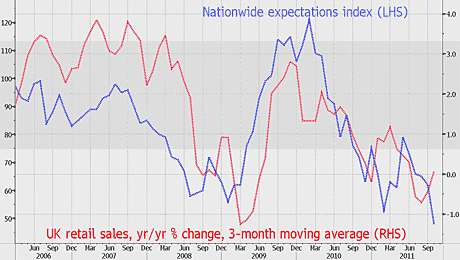The high street is still alive, if not exactly kicking.
October’s retail sales rose by 0.9% compared to last year, a better result than expected.
But don’t be fooled. The figures aren’t as upbeat as they seem. There’s plenty more misery on the way.
Yet amid all this, there are still opportunities to be found – even within the beleaguered consumer-dependent sectors…
This chart suggests retail sales are about to slump
Why shouldn’t you get excited about the October rally in retail sales?
Firstly, these sales came at the expense of profits. Britain’s retailers only managed to unload more stuff by cutting prices, as the recent dip in the inflation figures shows. So the net effect on the bottom line won’t be positive at all.
Secondly, the outlook for the UK is only getting bleaker, reckons Bank of England governor Mervyn King.
He’s partly worried because of the growing crisis in the eurozone. That’s likely to hit economic activity on this side of the Channel too, as my colleague John Stepek pointed out earlier this week.
But the main worry is the squeeze on disposable incomes. Pay packets are growing much more slowly than the cost of living. So there’s less spare cash to spend on non-essentials.
And that’s clearly having an impact on the mood of consumers. The Nationwide consumer confidence survey has become a handy guide as to how our citizens might spend what money they do have. In particular, the ‘expectations’ sub-index is a good predictor of future retail sales.
Take a look at the chart below. The Nationwide expectations index is in blue. Meanwhile, UK retail sales are indicated by the red line: we’ve shown the three-month moving average to smooth out monthly ‘noise’. With consumer expectations just dropping to a record low, the next move in retail sales looks likely to be firmly down.

The whole of the UK is heading for a slump
This will be no great shock to regular readers. We’ve been saying similar things for months now.
However, here’s another concern to add to the worry pile. We’re always hearing about the UK’s ‘North-South’ divide. The general idea is that the North is having it rough, while it’s pretty much OK in the South. So it’s up to the latter to carry the country through the worst of the slowdown.
But this simply isn’t the case, says Samuel Tombs at Capital Economics. The latest regional activity surveys suggest that it’s actually the UK’s southern regions that have borne the brunt of the overall economy’s weakness.
To be exact, the slowdown has been “particularly acute in London and the South East”. Meanwhile, activity actually picked in areas like the North West and Yorkshire & Humberside.
Now, normally, this would be good news. A rebalancing of growth to flatten out the gap between North and South would be a positive for the economy. The trouble is, this northern “resilience looks likely to be temporary”, says Tombs.
Why? Because employment in the North is more dependent on the public sector than in the South. So job cuts (if there are any – see Merryn’s blog for more on why ‘the cuts’ are nowhere near as deep as they need to be) under the government’s austerity programme looks set to hit the North harder than the South.
And that would knock any recent northern pick-up in economic activity on the head.
Or to put it another way, the consumer outlook is now looking grim for just about every part of the UK. For spending in the country’s shops, that’s an all-round piece of bad news.
One sector that can still thrive – tourism
We wouldn’t dismiss the entire high street out of hand. The damage to sales and profits from the consumer spending slowdown is steadily being factored into the sector’s share prices.
That means that one or two general retailing shares are starting to fall to potentially interesting levels. Industry bellwether Marks & Spencer (LSE: MKS), now trades on a p/e ratio below ten and a 5%-plus yield, as we show here.
But as for most stocks in the sector – steer well clear.
Yet in the middle of all this gloom, there’s still one crumb of comfort on the consumption front. Despite – or maybe because of – the grim domestic scene, we still like to get away on holiday.
For tourism, “the trend for the last 50 years has been one of almost constant growth”, notes my colleague James McKeigue in the latest MoneyWeek magazine cover story.
And even if weak economies cause Western demand to slump, international tourism can continue growing. That’s because “there are now plenty of Russians, Chinese and Brazilians ready to do battle for the best sun lounger by the pool”, says James.
Category: Economics

